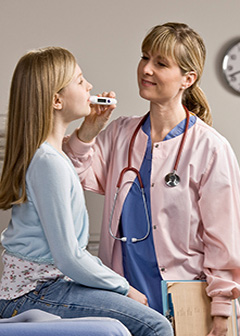
Some registered nurses work in hospital operating rooms.
Registered nurses usually take one of three education paths: a bachelor's of science degree in nursing (BSN), an associate’s degree in nursing (ADN), or a diploma from an approved nursing program. Registered nurses must also be licensed.
Education
In all nursing education programs, students take courses in nursing, anatomy, physiology, microbiology, chemistry, nutrition, psychology and other social and behavioral sciences, as well as in liberal arts. BSN programs typically take four years to complete; ADN and diploma programs usually take two to three years to complete.
All programs also include supervised clinical experience in hospital departments such as pediatrics, psychiatry, maternity, and surgery. A number of programs include clinical experience in extended and long-term care facilities, public health departments, home health agencies, or ambulatory (walk-in) clinics.
Bachelor's degree programs usually include more training in the physical and social sciences, communication, leadership, and critical thinking, which is becoming more important as nursing practice becomes more complex. They also offer more clinical experience in nonhospital settings. A bachelor's degree or higher is often necessary for administrative positions, research, consulting, and teaching.
Generally, licensed graduates of any of the three types of education programs (bachelor's, associate’s, or diploma) qualify for entry-level positions as a staff nurse.
Many registered nurses with an ADN or diploma find an entry-level position and then take advantage of tuition reimbursement benefits to work toward a BSN by completing an RN-to-BSN program. There are also master’s degree programs in nursing, combined bachelor’s and master’s programs, and programs for those who wish to enter the nursing profession but hold a bachelor’s degree in another field.
Important Qualities
Critical-thinking skills. Registered nurses must be able to assess changes in the health state of patients, including when to take corrective action and when to make referrals.
Compassion. Registered nurses should be caring and sympathetic, characteristics that are valuable when treating patients.
Detail oriented. Registered nurses must be responsible and detail oriented because they must make sure that patients get the correct treatments and medicines at the right time.
Emotional stability. Registered nurses need emotional stability to cope with human suffering, emergencies, and other stresses.
Organizational skills. Nurses often work with multiple patients with various health needs, and organizational skills are critical to ensure the patient is given proper care.
Patience. Registered nurses should be patient so they can provide quality care under stressful or hectic circumstances.
Speaking skills. Registered nurses must be able to talk effectively with patients to correctly assess their health conditions. Nurses need to clearly explain how to take medication or give other instructions. They must be able to work in teams with other health professionals and communicate the patients’ needs.
Licenses
In all states, the District of Columbia, and U.S. territories, registered nurses must have a nursing license.
To become licensed, nurses must graduate from an approved nursing program and pass the National Council Licensure Examination, or NCLEX-RN.
Other requirements for licensing vary by state. Each state's board of nursing can give details. (For more on the NCLEX-RN examination and a list of state boards of nursing visit the National Council of State Boards of Nursing.)
Certification
Nurses may become credentialed through professional associations in specialties such as ambulatory care, gerontology, and pediatrics, among others. Although certification is usually voluntary, it demonstrates adherence to a higher standard, and some employers may require it. Certification is required for all registered nurses serving in any of the four advanced practice registered nurse roles.
Advancement
Most registered nurses begin as staff nurses in hospitals or community health settings. With experience, good performance, and continuous education they can move to other settings or be promoted to positions with more responsibility.
In management, nurses can advance from assistant unit manager or head nurse to more senior-level administrative roles, such as assistant director, director, vice president, or chief of nursing. Increasingly, management-level nursing positions require a graduate degree in nursing or health services administration. Administrative positions require leadership, communication and negotiation skills, and good judgment.
Some RNs choose to become advanced practice registered nurses (APRNs). APRNs work independently or in collaboration with physicians. They may provide primary care, and, in most states, they may prescribe medications. APRNs require at least a master's degree. Each state’s board of nursing can provide the specific regulations regarding APRNs.
Some nurses move into the business side of healthcare. Their nursing expertise and experience on a healthcare team equip them to manage ambulatory, acute, home-based, and chronic care businesses.
Employers—including hospitals, insurance companies, pharmaceutical manufacturers, and managed care organizations, among others—need registered nurses for jobs in health planning and development, marketing, consulting, policy development, and quality assurance.
Other nurses work as postsecondary teachers in colleges and universities. For more information, see the profile on postsecondary teachers.









